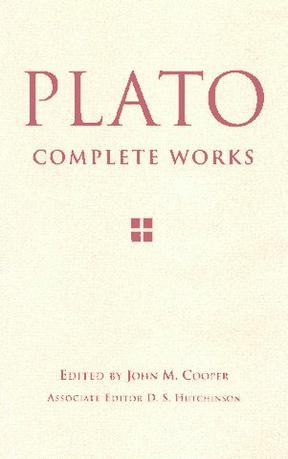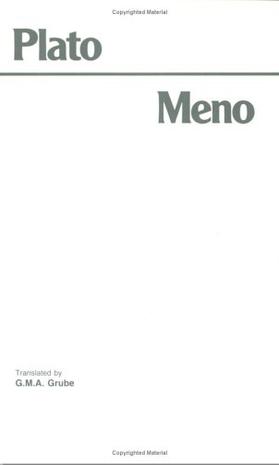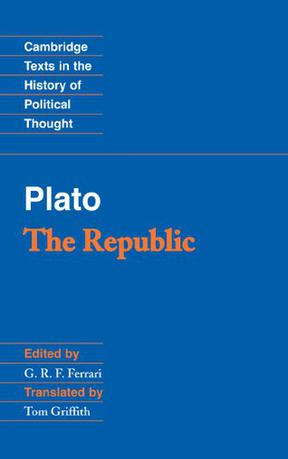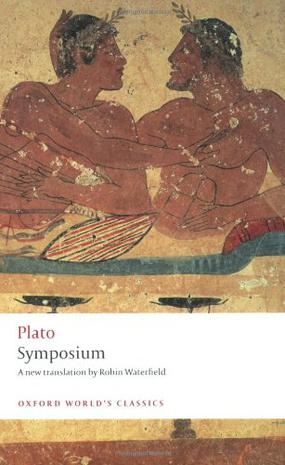-

柏拉图与《理想国》
柏拉图是西方哲学史上的鼻祖式的人物。《理想国》为其思想的标志,它集柏拉图的政治学、伦理学、本体论和认识论于一体。本书为读者提供了详尽的指引和导读。 本书融介绍和分析于一体,既适合于初学者对《理想国》的中心思想进行提纲挈领的把握,也适合于那些对《理想国》已经有一定认识的专业人士对其中的问题进行进一步的思考和分析。在众多的《理想国》介绍和研究著作中·N·帕帕斯的这本代表作受到广泛关注和赞誉,以其鲜明的论述风格和深刻的启示意义,获得了独特的地位。 -

Plato
-

Meno
"Fine translation, good notes - inexpensive, too!" -- D A Rohatyn, University of San Diego -

The Republic
First published in 2000, this translation of one of the great works of Western political thought is based on the assumption that when Plato chose the dialogue form for his writing, he intended these dialogues to sound like conversations - although conversations of a philosophical sort. In addition to a vivid, dignified and accurate rendition of Plato's text, the student and general reader will find many aids to comprehension in this volume: an introduction that assesses the cultural background to the Republic, its place within political philosophy, and its general argument; succinct notes in the body of the text; an analytical summary of the work's content; a full glossary of proper names; a chronology of important events; and a guide to further reading. The result is an accomplished and accessible edition of this seminal work, suitable for philosophers and classicists as well as historians of political thought at all levels. -

Symposium
Review An all-male dinner party in Athens in 416 BC, with plentiful wine and attentive serving-girls, seems an unlikely setting for one of the world's greatest treatises on the nature of love. Yet in the Symposium Plato presents a series of witty, erudite and immensely readable speeches on love, in a setting which would be very familiar to the Athenians of the day. Students of classical Greek will delight in Robin Waterfield's fluent yet comfortable translation. His emphasis on accessibility rather than over-literalism has produced a translation sparkling with wit and ideas, which classicists and non-classicists alike will enjoy reading. Waterfield's fascinating introduction to the text provides valuable background to the sexual mores of the time and the social culture of classical Greece. He also examines each speech in detail, elucidating some of the more oblique points of the text to enable the reader to tackle it with confidence. The Greek playwright Agathon has walked off with the laurels at a recent competition, and is celebrating his victory with a select dinner party, or symposium. As he and his guests take their places, they decide to hold back on the amount of wine they consume and talk about love. The guests at the symposium are a mixed bunch of characters, who deliver their speeches in various styles and with different reactions from their appreciative listeners. Agathon's fellow playwright, the comic master Aristophanes, is there, as is Erxymachus, a doctor, and of course Socrates himself, brilliant philosopher and Plato's mentor. The conversation ranges from a declaration of the importance of homoerotic love to Socrates's account of his discussions with the prophetess Diotima, who claimed that we can only achieve true goodness through love. Into this scene of convivial discussion bursts Alcibiades, ex-lover of Socrates, military genius and famous bon viveur with a scandalous reputation. Thrusting himself between Socrates and his latest lover, Agathon, Alcibiades insists on joining in with the discussion but soon digresses and talks about his own love for Socrates. Although some critics have found the gate-crashing Alcibiades's speech sits awkwardly on such profound metaphysical discussion, it reminds the reader of the physical reality of love, while making several pointed references back to earlier speeches. As Waterfield says at the beginning of his introduction, the Symposium should be read at a sitting and re-visited for further enjoyment and insight. Layer after layer of meaning becomes revealed, and this slender dialogue proves to be a box of ever-increasing delights. (Kirkus UK) -

Symposium
In his celebrated masterpiece, Symposium, Plato imagines a high-society dinner-party in Athens in 416 BC at which the guests - including the comic poet Aristophanes and, of course, Plato's mentor Socrates - each deliver a short speech in praise of love. The sequence of dazzling speeches culminates in Socrates' famous account of the views of Diotima, a prophetess who taught him that love is our means of trying to attain goodness. And then into the party bursts the drunken Alcibiades, the most popular and notorious Athenian of the time, who insists on praising Socrates himself rather than love, and gives us a brilliant sketch of this enigmatic character. The power, humour, and pathos of Plato's creation engages the reader on every page. This new translation is complemented by full explanatory notes and an illuminating introduction. ABOUT THE SERIES: For over 100 years Oxford World's Classics has made available the widest range of literature from around the globe. Each affordable volume reflects Oxford's commitment to scholarship, providing the most accurate text plus a wealth of other valuable features, including expert introductions by leading authorities, helpful notes to clarify the text, up-to-date bibliographies for further study, and much more.